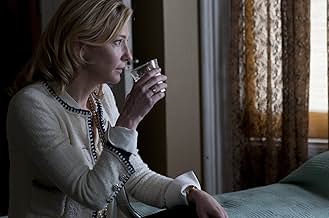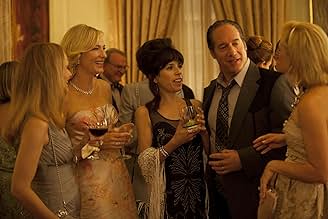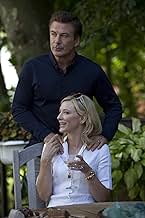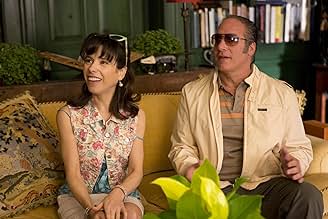La película de una mujer, en bancarrota tras el suicidio de su marido, un financiero adinerado. Jasmine tiene que mudarse con su hermana, pero no puede olvidar la vida lujosa que una vez tuv... Leer todoLa película de una mujer, en bancarrota tras el suicidio de su marido, un financiero adinerado. Jasmine tiene que mudarse con su hermana, pero no puede olvidar la vida lujosa que una vez tuvo.La película de una mujer, en bancarrota tras el suicidio de su marido, un financiero adinerado. Jasmine tiene que mudarse con su hermana, pero no puede olvidar la vida lujosa que una vez tuvo.
- Dirección
- Guionista
- Elenco
- Ganó 1 premio Óscar
- 56 premios ganados y 83 nominaciones en total
- Dirección
- Guionista
- Todo el elenco y el equipo
- Producción, taquilla y más en IMDbPro
Opiniones destacadas
It's a great and unexpected surprise when Woody can beat both the Coens and the French these days in a film about delusion and self. I'm not a fan of his overall trajectory and predilections, but I won't deny any film its effectiveness.
Woody here pierces through to the essential thing. It's a film about modern suffering but that is clearly seen here as attachment to internal narrative, not just a general thickness around being. He maintains inextricability; it is both her fault and a life of circumstance with no clean separation. The woman still carries echoes of that previous narrative around her, soon it becomes clear that the explanatory flashbacks are hallucinated after the fact.
Overall Woody here arrives at a tender admission. It would be all too easy to discard or condemn her as pampered and sheltered, this is only part of the thrust here. He doesn't romanticize privilege the way Sofia Coppola is prone to, another plus: we're called to sympathize with more than a victim. The admission is that life in its course of being lived leaves indelible marks in the story of who you are, that this is only real to the extend that you inhabit the story, and yet that's it's genuinely hard to distinguish one self from the other.
He doesn't give this internal world to us with particular visual richness, few filmmakers his age do. There is 'color and shape', tied to the narrator's vivid imagination who aspires to be an 'interior designer', but Woody could have done so much more with the logic of memory. No, the real effect here is geared in the combination of asking the multilayered Blanchett to inhabit a character who inhabits and continuously recalls a story. She's marvelous. She seems to know the degree to which Jasmine blurs the recalled story to be only about color and appearances is the same one to which she blurs the current one, true love from convenience, responsibility from mere absent-mindedness, all these Blanchett truly, genuinely blurs around the character she inhabits.
It's deceptively easy to consume this thinking Jasmine knew in advance or was never in love, be aware and sensitive to this difference. It blooms once you reflect back on it, inhabit her world instead of pass through with moral superiority, because doing this means that your own tools of defining truth must be called into judgement.
It's a fine film, much better than the hollow inhabiting of his Midnight. This one cuts. A Woman Under the Influence appears to have been a template, Jasmine's muttering to herself on the street is a reference. Like that film, it is as much the filmmaker's as the actresses' creation, impossible without the richness Blanchett fleshes with.
Woody here pierces through to the essential thing. It's a film about modern suffering but that is clearly seen here as attachment to internal narrative, not just a general thickness around being. He maintains inextricability; it is both her fault and a life of circumstance with no clean separation. The woman still carries echoes of that previous narrative around her, soon it becomes clear that the explanatory flashbacks are hallucinated after the fact.
Overall Woody here arrives at a tender admission. It would be all too easy to discard or condemn her as pampered and sheltered, this is only part of the thrust here. He doesn't romanticize privilege the way Sofia Coppola is prone to, another plus: we're called to sympathize with more than a victim. The admission is that life in its course of being lived leaves indelible marks in the story of who you are, that this is only real to the extend that you inhabit the story, and yet that's it's genuinely hard to distinguish one self from the other.
He doesn't give this internal world to us with particular visual richness, few filmmakers his age do. There is 'color and shape', tied to the narrator's vivid imagination who aspires to be an 'interior designer', but Woody could have done so much more with the logic of memory. No, the real effect here is geared in the combination of asking the multilayered Blanchett to inhabit a character who inhabits and continuously recalls a story. She's marvelous. She seems to know the degree to which Jasmine blurs the recalled story to be only about color and appearances is the same one to which she blurs the current one, true love from convenience, responsibility from mere absent-mindedness, all these Blanchett truly, genuinely blurs around the character she inhabits.
It's deceptively easy to consume this thinking Jasmine knew in advance or was never in love, be aware and sensitive to this difference. It blooms once you reflect back on it, inhabit her world instead of pass through with moral superiority, because doing this means that your own tools of defining truth must be called into judgement.
It's a fine film, much better than the hollow inhabiting of his Midnight. This one cuts. A Woman Under the Influence appears to have been a template, Jasmine's muttering to herself on the street is a reference. Like that film, it is as much the filmmaker's as the actresses' creation, impossible without the richness Blanchett fleshes with.
I confess, I don't usually enjoy Woody Allen movies. There's too much fretting about relationships, and there's too much talking. This, however, was an unexpected, pleasant surprise. The key to the plot all devolves from Jasmine's marriage to a New York financial whiz of questionable integrity. Alec Baldwin hits the part out of the park which allows the movie to spend its quality time exploring the toxic relationship to wealth some people have.
The second most salient plot element is Jasmine's adoptive sister, Ginger, played by Sally Hawkins, who is as unforgettably effective as the other leads. As a guy, I've known women exactly like her, and I would be surprised if any woman in the audience didn't. The interaction between Ginger and Jasmine keeps the entire movie roiling. It involves her sister taking Jasmine in despite her having looked down on her since she became rich.
We're also treated to excellent performances in smaller roles by Andrew Dice Clay, and, my favorite, Bobby Cannavale, as Ginger's boyfriend, Chili. There's even more to be said about the acting than just these standouts that I won't include for the sake of brevity, but suffice it to say, it's all top notch.
The real payoff here is what Mr Allen is choosing to depict of those whose life is overly dependent on wealth. Woody Allen had always seemed fairly indifferent to wealth to me, so I imagined he wanted to protect those who had it, which put me off. But that's not the case here. Mr Allen is quite pointed about what's out there in terms of financial hazards, and how it can destroy lives.
As to Cate Blanchett there is something odd going on with her in this movie. I've seen many great performances by actresses, in particular, but never one that seemed as if the actress was somehow only devoting maybe 90% of her skill to a difficult role, and still she pulls it off brilliantly! That missing 10% is somehow not acting and with us, the audience, as her real self, quite conscious of the moment, and it's like spending time with an attractive woman. It's almost as if we're also actors and she's showing us only enough for us to see what she's capable of. She thinks she can trust us to understand where she's taking her performance, and somehow it works. This is the most wonderful acting by an actress I've seen this winter, a real delight, and I can't imagine her being bested at the Oscars.
So, in short, I'm surprised to find that this is my favorite Woody Allen movie for a variety of reasons, and I highly recommend it.
The second most salient plot element is Jasmine's adoptive sister, Ginger, played by Sally Hawkins, who is as unforgettably effective as the other leads. As a guy, I've known women exactly like her, and I would be surprised if any woman in the audience didn't. The interaction between Ginger and Jasmine keeps the entire movie roiling. It involves her sister taking Jasmine in despite her having looked down on her since she became rich.
We're also treated to excellent performances in smaller roles by Andrew Dice Clay, and, my favorite, Bobby Cannavale, as Ginger's boyfriend, Chili. There's even more to be said about the acting than just these standouts that I won't include for the sake of brevity, but suffice it to say, it's all top notch.
The real payoff here is what Mr Allen is choosing to depict of those whose life is overly dependent on wealth. Woody Allen had always seemed fairly indifferent to wealth to me, so I imagined he wanted to protect those who had it, which put me off. But that's not the case here. Mr Allen is quite pointed about what's out there in terms of financial hazards, and how it can destroy lives.
As to Cate Blanchett there is something odd going on with her in this movie. I've seen many great performances by actresses, in particular, but never one that seemed as if the actress was somehow only devoting maybe 90% of her skill to a difficult role, and still she pulls it off brilliantly! That missing 10% is somehow not acting and with us, the audience, as her real self, quite conscious of the moment, and it's like spending time with an attractive woman. It's almost as if we're also actors and she's showing us only enough for us to see what she's capable of. She thinks she can trust us to understand where she's taking her performance, and somehow it works. This is the most wonderful acting by an actress I've seen this winter, a real delight, and I can't imagine her being bested at the Oscars.
So, in short, I'm surprised to find that this is my favorite Woody Allen movie for a variety of reasons, and I highly recommend it.
Woody Allen's finely tuned screen-writing skills and his talent for eliciting standout and often award-winning performances from his leading ladies are on full display in "Blue Jasmine." Alec Baldwin, the slick husband of a middle-aged socialite, Cate Blanchett, pulls a Bernie-Madoff swindle and ends up in jail. The homes, the cars, the furs, the jewels, the furniture all go to the Feds, and the penniless Cate flies first class to San Francisco with her Louis Vuitton luggage to stay with her non-biological sister, Sally Hawkins, until she gets back on her feet. Blanchett, the Jasmine of the title, is totally unprepared for her economic fall. She decides to become an interior designer, but wants to study on-line; however, she is computer illiterate and must take a course, before she can begin to study decorating; but, she needs money for the courses and takes a receptionist job with a lecherous dentist. Although the film addresses serious issues, the Allen humor will provoke smiles and an occasional chuckle, from small well-observed moments such as the attempts of indecisive patients to make dental appointments.
Understandably, Cate Blanchett's Jasmine teeters on the edge of a nervous breakdown; she lies instinctively, even to herself; and she cannot or will not face the reality of her downward mobility. The role is an actress's showcase, and Blanchett is in top form; her nervous rambling monologues, either to herself or to unwilling strangers, provide a study guide for aspiring actors. Jasmine brays at her "sister," Ginger, effortlessly and engagingly played by Hawkins; she nags about Ginger's job, lover, and living quarters, until Ginger points out Jasmine's own diminished situation. Jasmine bellows that Ginger can do better than her amorous boyfriend, Chili, a charismatic Bobby Cannavale with a bad haircut and faded tattoo; eventually, Ginger reminds her that her own choice of husband was less than stellar. Jasmine, Ginger, and Chili make an aromatic trio, whose names perhaps allude to their personalities, and they are ably supported by Louis C.K., a horny guy with the hots for Ginger, and Peter Sarsgaard, a respectable diplomat seeking a suitable wife for his political career.
In keeping with the film's title, Woody uses blues on the soundtrack, and his cinematographer, Javier Aguirresrobe, lenses the dual New York and San Francisco locales effectively. Although the jump cuts in time are jarring initially, viewers will quickly accommodate to New York being the past and San Francisco the present. Woody at age 78 is a master writer, especially of women's characters, and "Blue Jasmine" finds him at his best. Although Woody's trademark humor flickers throughout, the film is essentially about a vulnerable woman standing amidst the ruins of her former life and facing a precariously uncertain future. Audiences may come out praising the performers, but humming the blues.
Understandably, Cate Blanchett's Jasmine teeters on the edge of a nervous breakdown; she lies instinctively, even to herself; and she cannot or will not face the reality of her downward mobility. The role is an actress's showcase, and Blanchett is in top form; her nervous rambling monologues, either to herself or to unwilling strangers, provide a study guide for aspiring actors. Jasmine brays at her "sister," Ginger, effortlessly and engagingly played by Hawkins; she nags about Ginger's job, lover, and living quarters, until Ginger points out Jasmine's own diminished situation. Jasmine bellows that Ginger can do better than her amorous boyfriend, Chili, a charismatic Bobby Cannavale with a bad haircut and faded tattoo; eventually, Ginger reminds her that her own choice of husband was less than stellar. Jasmine, Ginger, and Chili make an aromatic trio, whose names perhaps allude to their personalities, and they are ably supported by Louis C.K., a horny guy with the hots for Ginger, and Peter Sarsgaard, a respectable diplomat seeking a suitable wife for his political career.
In keeping with the film's title, Woody uses blues on the soundtrack, and his cinematographer, Javier Aguirresrobe, lenses the dual New York and San Francisco locales effectively. Although the jump cuts in time are jarring initially, viewers will quickly accommodate to New York being the past and San Francisco the present. Woody at age 78 is a master writer, especially of women's characters, and "Blue Jasmine" finds him at his best. Although Woody's trademark humor flickers throughout, the film is essentially about a vulnerable woman standing amidst the ruins of her former life and facing a precariously uncertain future. Audiences may come out praising the performers, but humming the blues.
What a treat! Cate Blanchett gives a stunning performance as a Blanche-like character written and directed by the most prolific American author of the last 40 years. Cate seems to be an actress without emotional borders. Jasmine walks a very tight rope, her sense of despair etched in her magnificent face vanishes ipso facto when she meets Peter Sarsgaard. She realizes in a sort of disbelief -extraordinary, heartbreaking and horribly funny moment - that he could be the rescue raft in her own personal tsunami. Sally Hawkins, another stroke of genius in the casting department, is a profoundly human creature very much the Stella of the situation. This two sisters, adopted both from different parents are also from different, if immediately recognizable, universes. I could go on and on but I'm not going to, I just wanted to urge you, in this times of 3D super extra loud marvel sequels, to run and see it.
"Blue Jasmine" is a Drama movie in which we follow Jasmine, a once-wealthy New York socialite who struggles to cope with a dramatic fall from grace after her husband's financial scandal.
I found this movie interesting and emotionally intense, since it explore themes like loss, delusion, and personal unraveling. The interpretation of Cate Blanchett who played as Jasmine was extraordinary and the undeniable highlight of the movie. She delivered a captivating portrayal of a woman slowly descending into madness, while the contrast between her past extravagant life and her current crumbling reality created a compelling narrative. I believe that Cate Blanchett made one of her best performance if not her best, something that engaged the audience. The direction which was made by Woody Allen was very good and he brought out strong interpretations from the entire cast. All in all, I have to say that "Blue Jasmine" is an amazing movie and I strongly recommend everyone to watch it.
I found this movie interesting and emotionally intense, since it explore themes like loss, delusion, and personal unraveling. The interpretation of Cate Blanchett who played as Jasmine was extraordinary and the undeniable highlight of the movie. She delivered a captivating portrayal of a woman slowly descending into madness, while the contrast between her past extravagant life and her current crumbling reality created a compelling narrative. I believe that Cate Blanchett made one of her best performance if not her best, something that engaged the audience. The direction which was made by Woody Allen was very good and he brought out strong interpretations from the entire cast. All in all, I have to say that "Blue Jasmine" is an amazing movie and I strongly recommend everyone to watch it.
¿Sabías que…?
- TriviaBecause Woody Allen doesn't get into motivation or background of a character when he's directing actors, Cate Blanchett and Sally Hawkins got together and invented the background for the sisters' relationship. So every scene when they talked about their past, although it's vague on the script and for the viewer, they both knew exactly what the sisters are talking about.
- ErroresWhen Ginger, Jasmine, Chili and Eddie are at the clams restaurant, Eddie asks Jasmine what would she be if she had finished her education. She answers, "An anthropologist". Eddie ignorantly asks, "Really, digging up fossils?" Jasmine replies mockingly: "That's an archaeologist". She is wrong. The correct answer would be, "That's a paleontologist". Jasmine is belittling Eddie for his ignorance, but she is in fact displaying ignorance herself.
- ConexionesFeatured in The Tonight Show with Jay Leno: Episode #21.188 (2013)
- Bandas sonorasBack O'Town Blues
Composed by Louis Armstrong & Luis Russell
Performed by Louis Armstrong and the All-Stars
Courtesy of The Verve Music Group
Under license from Universal Music Enterprises
Selecciones populares
Inicia sesión para calificar y agrega a la lista de videos para obtener recomendaciones personalizadas
- How long is Blue Jasmine?Con tecnología de Alexa
Detalles
- Fecha de lanzamiento
- País de origen
- Sitios oficiales
- Idioma
- También se conoce como
- Blue Jasmine
- Locaciones de filmación
- Ocean Beach, San Francisco, California, Estados Unidos(Ginger and Al walking along the beach)
- Productoras
- Ver más créditos de la compañía en IMDbPro
Taquilla
- Presupuesto
- USD 18,000,000 (estimado)
- Total en EE. UU. y Canadá
- USD 33,405,481
- Fin de semana de estreno en EE. UU. y Canadá
- USD 612,064
- 28 jul 2013
- Total a nivel mundial
- USD 99,104,804
- Tiempo de ejecución1 hora 38 minutos
- Color
- Mezcla de sonido
- Relación de aspecto
- 2.35 : 1
Contribuir a esta página
Sugiere una edición o agrega el contenido que falta

Principales brechas de datos
What is the streaming release date of Jazmín Azul (2013) in Canada?
Responda
































